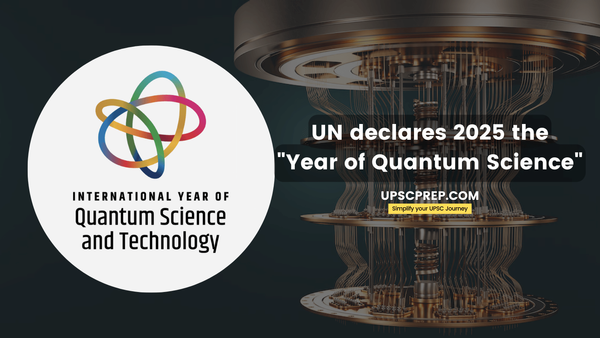Table of contents
The United Nations has designated 2025 as the ‘International Year of Quantum Science and Technology’.
This initiative aims to increase public awareness and understanding of quantum science and its applications through a series of global activities.
Let's delve into the key aspects and significance of this proclamation:
Background and Proclamation
- Resolution and Adoption: The initiative began with a resolution led by Mexico in May 2023, which quickly garnered support from nearly 60 countries.
- By November 2023, the UNESCO General Conference adopted the resolution.
- In May 2024, Ghana submitted a draft resolution to the U.N. General Assembly, supported by over 70 countries, leading to the official proclamation on June 7, 2024.

- Historical Context: In 2025, Werner Heisenberg will have celebrated a century since he published his seminal paper on quantum mechanics, which laid the foundation for the field.
- Heisenberg's work, including the uncertainty principle, earned him the Nobel Prize in Physics.

Endorsements and Support
The proclamation has received endorsements from several prestigious scientific unions, including:
- International Union of Pure and Applied Physics
- International Union of Pure and Applied Chemistry
- International Union of Crystallography
- International Union of History and Philosophy of Science and Technology
Quantum Science and Technology
Quantum science deals with the behaviour of matter and energy at the smallest scales, whereas classical mechanics fails to explain phenomena. Key areas include:
- Quantum Computing: Utilizes quantum bits (qubits) to perform computations far more efficiently than classical computers.
- Quantum Communication: Ensures secure communication channels using principles like quantum entanglement.
- Quantum Sensing and Metrology: Enhances precision measurements and sensing capabilities.
- Quantum Materials and Devices: Develop new materials with unique quantum properties.
National Quantum Mission (India)
In line with the global focus on quantum technologies, the Government of India announced the ‘National Quantum Mission’ in April 2023, with a budget of Rs 6,000 crore.
The mission, to be implemented from 2023 to 2031 by the Department of Science & Technology (DST), focuses on four verticals:
- Quantum Computing
- Quantum Communication
- Quantum Sensing and Metrology
- Quantum Materials and Devices
Potential Impact of Quantum Technologies
Quantum technologies are expected to revolutionize various fields due to their superior computational and sensing capabilities:
- Electronics: Enhanced performance and miniaturization of electronic devices.
- Clean Energy: Improved efficiency in energy production and storage.
- Drug Development: Accelerated discovery and development of new pharmaceuticals.
Global Initiatives and Public Awareness
The U.N. proclamation encourages individuals, groups, schools, institutions, and governments to use 2025 as an opportunity to promote quantum science and technology. A steering committee is planning global initiatives and events to reach diverse audiences, particularly those unaware of the importance of quantum science.
Conclusion
The designation of 2025 as the International Year of Quantum Science and Technology by the United Nations underscores the growing significance of quantum technologies in modern science and industry. This initiative aims to foster global awareness and understanding, paving the way for advancements that could transform various sectors. The National Quantum Mission in India aligns with this global focus, highlighting the country's commitment to becoming a leader in quantum research and applications.
Previous Post